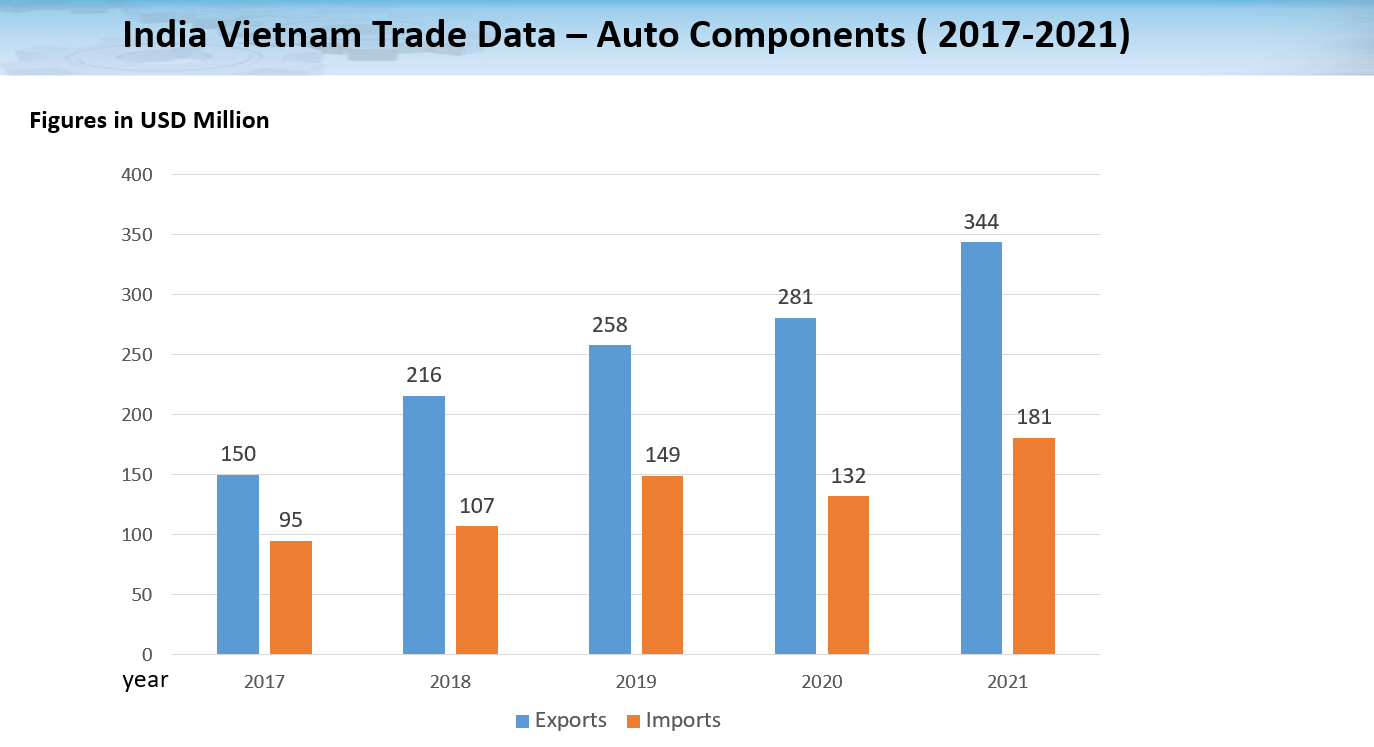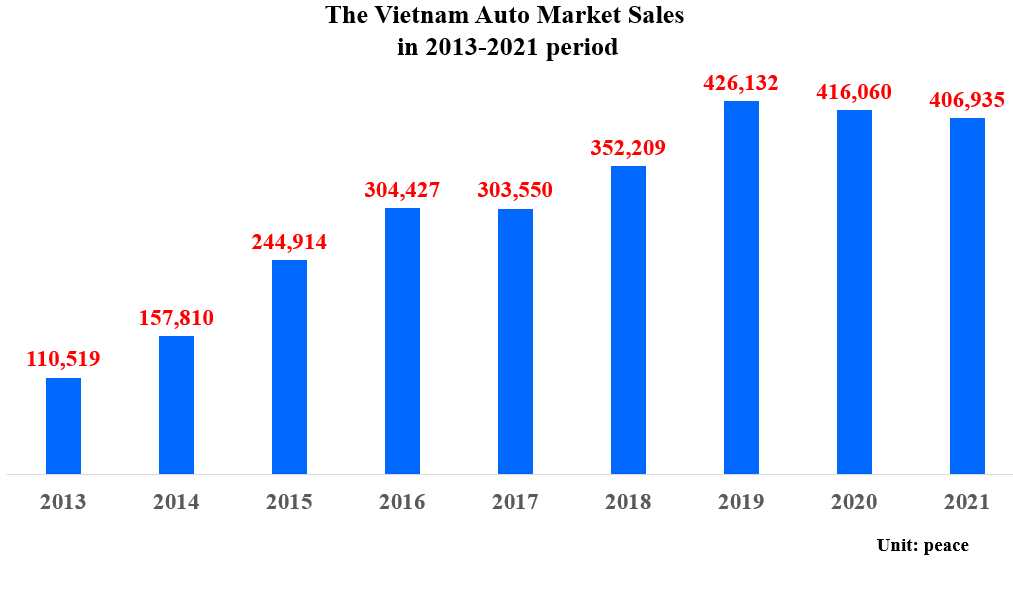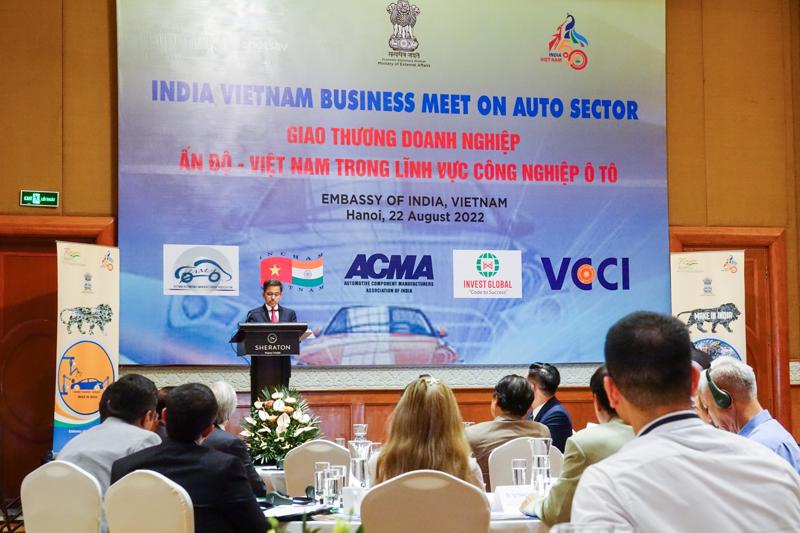“Auto Vietnam Business on Automotive Sector” was jointly organized at the Sheraton Hanoi Hotel on August 22 by the Embassy of India in Vietnam, the Indian Business Chamber in Vietnam (INCHAM), the Automotive Component Manufacturers Association of India (ACMA), Invest Global, the Vietnam Automobile Manufacturers Association (VAMA), and the Vietnam Chamber of Commerce and Industry (VCCI).
The event also saw the participation of 25 Indian enterprises from ACMA and representatives from ministries, agencies, associations, and businesses in the field.
Potential prospects
According to H.E. Pranay Verma, Ambassador of India to Vietnam, the two are celebrating the 50th anniversary of diplomatic relations this year and bilateral relations have grown strongly in the years since. “With the elevation of bilateral relations to comprehensive strategic partnership, cooperation has become truly multi-faceted,” the Ambassador said. “Both sides have agreed to cooperate in providing reliable, efficient and resilient supply chains, to facilitate long-term investment in each other’s economy.”
Similarly, Mr. Nguyen Anh Tuan, Deputy Director General of the Foreign Investment Agency (FIA) at the Ministry of Planning and Investment (MPI), told the gathering that this is a meaningful event, especially in the context of the two celebrating 50 years of relations. “The relationship between the two countries has made remarkable progress over the past 50 years, bringing many bilateral benefits in fields such as politics, security, and education and training, etc.,” he said.
Figures from the FIA show that India has 334 projects in Vietnam with total investment of $1 billion, accounting for 0.2 per cent of FDI, and ranks 34th out of 139 countries and territories. “From such figures, we can see that investment cooperation between Vietnam and India is still not commensurate with potential,” said Mr. Tuan.

Meanwhile, Vietnam’s automotive sector still has a great deal of potential for development, as the country is considered a high-middle-income country. According to the Vietnam Institute of Industrial and Trade Policy and Strategy (VIOIT), the country has the potential to grow in the electric vehicle (EV) market as its car ownership rate stands at 23 cars per 1,000 people. With rising incomes, most Vietnamese families are expected to have their own motor car and the need to travel by private vehicle is increasing, leading to sales and output in the automotive sector rising strongly in the 2021-2030 period.
Investment boost
FIA figures also show that India is currently ranked 20th out of 34 countries and territories investing in Vietnam’s automotive sector. And Vietnam has some 300 enterprises engaged in the production of auto parts and components for the sector. “Vietnam boasts the presence of major international players in the automotive market, such as Honda, Toyota, and Ford, which in turn has motivated businesses in automotive components, such as those from India, to boost their investment in Vietnam,” Mr. Tuan said.

Indian enterprises are therefore looking for investment opportunities in the country’s automotive sector as they find it holds great potential for development. “India’s automotive sector looks forward to active cooperation with the sector in Vietnam so that we can synergize and jointly explore newer markets,” said Mr. Yuvraj Kapuria, Chairman of YBLF and Vice President of Hi-Tech Gears Ltd. “The ACMA delegation to Vietnam is an exploratory one and we are open to all modes of cooperation, including investing in Vietnam.”
“At this event, knowing a few policies coming the government, which make investment lucrative, my company will look at options for investing in Vietnam,” said Mr. Sumit Punia, Director of Kamal CED Solutions LLP.
Mr. Harshal Subhash Nahar, Managing Director of the Laxmi Group, said the government has introduced many proactive policies that will have a positive impact on attracting investors to Vietnam. “These have ensured robust competition with Vietnam opening its door to investors,” he said.
Representatives from cities and provinces also expressed a desire to cooperate and attract investment from Indian enterprises. According to Mr. Tran Khanh Thuc, Director of the Foreign Affairs Department in north-central Nghe An province, investment from India is still quite modest, with three projects and total investment of $10 million. “The province therefore expects to see a new wave of investment from Indian enterprises, especially in the fields of processing, manufacturing, information technology, and communications, etc., and the supporting industry,” he said.
“In recent years, Thanh Hoa province has held many meetings and worked with Indian investors,” said Mr. Bui Tuan Tu, Deputy Director of the Nghi Son Economic Zone Management Board in north-central Thanh Hoa province. Investors are looking at investment in two industrial parks in Nghi Son. “It is expected to attract 100 investors from India and other countries in the field of pharmaceutical research and production,” Mr. Tu said.
ACMA and the Vietnam Association of Foreign Invested Enterprises (VAFIE) also signed an MoU at the event, which affirms the investment of Indian enterprises in the country. “We hope that more Indian enterprises will come to invest in Vietnam, as the two countries still hold a lot of potential in cooperation,” Mr. Tuan emphasized.




![[Interactive]: Economic overview - January 2026](https://premedia.vneconomy.vn/files/uploads/2026/02/09/d24c3b3cc20f441bb395a89e62a2764e-69165.png?w=400&h=225&mode=crop)




 Google translate
Google translate